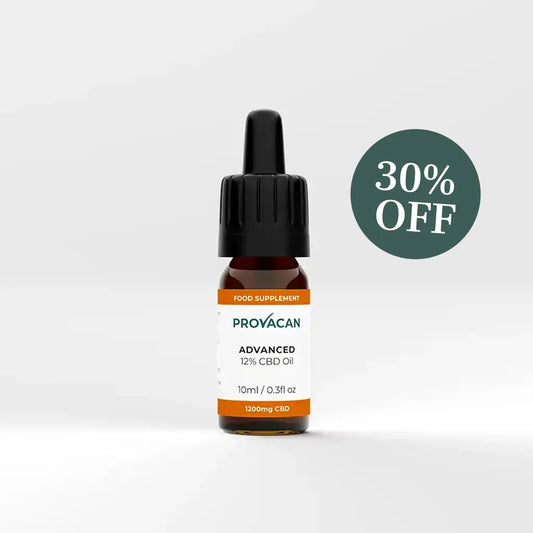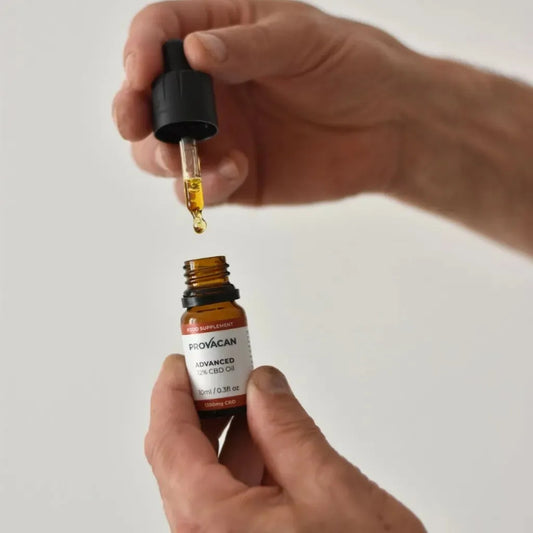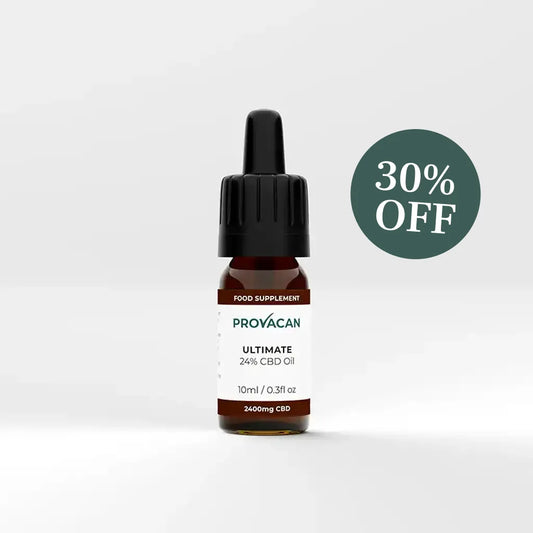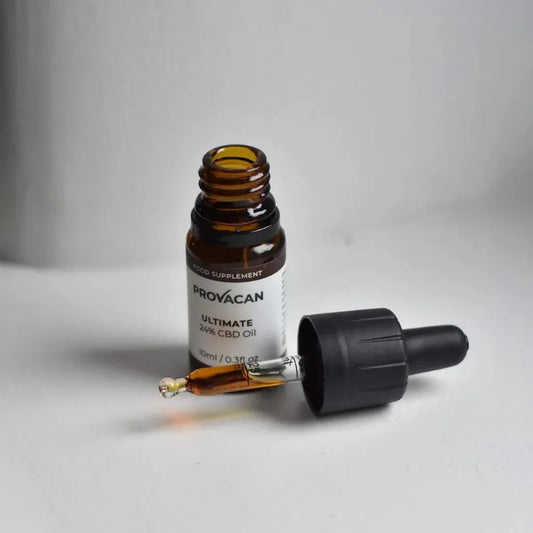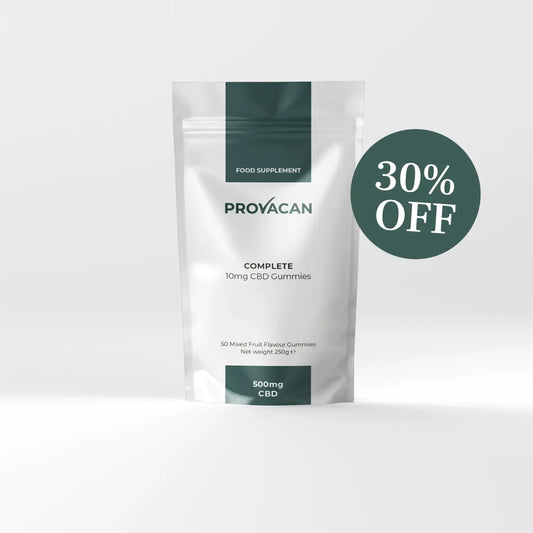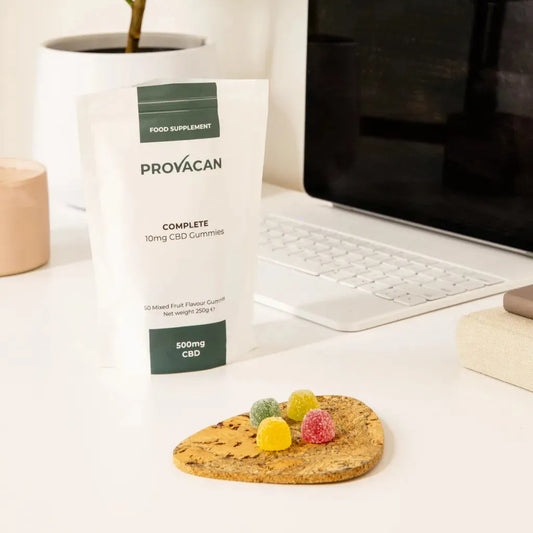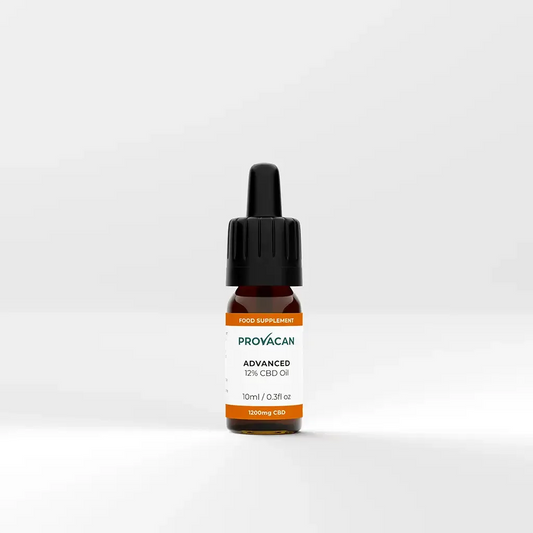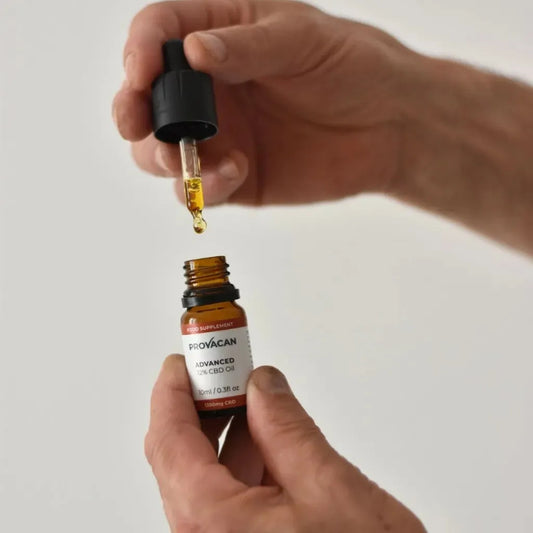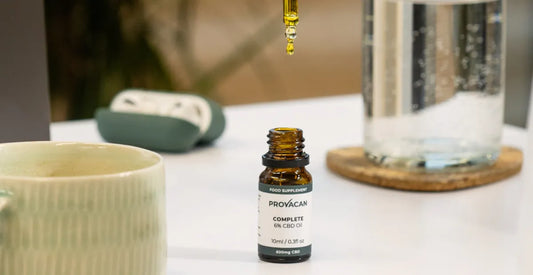Key takeaways:
- Understanding CBD carrier oils: A CBD carrier oil is essential for effective absorption of cannabidiol. Common options include MCT oil, hemp seed oil, and olive oil, each offering different benefits in terms of bioavailability, digestion, and nutritional value.
- How different oils compare: MCT oil is fast-absorbing and neutral in taste, while hemp seed oil offers nutritional synergy with CBD. Olive oil, known for its stability, digestive comfort, and rich nutrient profile, is a trusted choice for those seeking a well-rounded, gentle experience.
- Why carrier oil matters in your CBD product: The best carrier oil for CBD depends on your personal goals, preferences, and sensitivities. At Provacan, we choose our oils based on safety, stability, and how well they complement the benefits of CBD.
At Provacan, we want to help you feel confident in your CBD choices. That means giving you the lowdown on the pros and cons of different carrier oils – and explaining exactly why we’ve chosen the ingredients we use in each of our products.
What is CBD oil?
Full Spectrum CO₂ Hemp Extract is a hemp-derived oil that contains the full range of natural compounds found in the hemp plant: CBD, trace amounts of THC (under 0.2%), other cannabinoids, terpenes, and flavonoids. It's extracted using CO₂, a clean, solvent-free method that preserves these beneficial compounds. This type of extract supports what’s known as the entourage effect, where all components work together to enhance the overall therapeutic benefits.
What is a CBD carrier oil and why do we need it?
These active plant compounds need to be dissolved in an oil base to be absorbed effectively by the body. That’s where carrier oils come in. There are several types on the market, but the most common ones you’ll come across are MCT oil, hemp seed oil, and olive oil.
Later on, we’ll reveal which oil we prefer here at Provacan – and why.
MCT oil vs hemp seed oil vs olive oil comparison: which is the best carrier oil for CBD?
CBD carrier oil comparison table
| Carrier oil | Source | Fatty acid profile | Absorption rate | Key benefits | Flavour | Shelf life |
|---|---|---|---|---|---|---|
| MCT oil | Coconut or palm kernel | High in caprylic and capric acids (medium-chain triglycerides) | Fast | Enhances CBD bioavailability, antimicrobial, easy to digest | Mild, neutral | 1–2 years |
| Hemp seed oil | Seeds of the hemp plant | Balanced omega-3 and omega-6 fatty acids | Moderate | Synergistic with CBD, anti-inflammatory, skin-supportive | Nutty, earthy | 6–12 months |
| Olive oil | Pressed olives | High in oleic acid (omega-9) | Slow | Heart-healthy, antioxidant-rich, shelf-stable | Rich, herbal | 1.5–2 years |
In-depth comparison of the best carrier oils for CBD: benefits and considerations
1. MCT oil for CBD
MCT (medium-chain triglyceride) oil is a popular carrier for CBD, and for good reason. Thanks to its fast absorption and high bioavailability, it helps deliver CBD quickly into the bloodstream, making it an efficient choice for fast-acting relief. Its light texture and neutral taste are ideal for users who prefer a milder flavour, and it has a long shelf life, which helps preserve the potency of CBD over time. Additionally, MCT oil mixes well with other ingredients, making it a versatile option in tinctures, capsules, and edibles.
On the downside, some people may experience digestive upset, like gas, cramps, or diarrhoea, especially when first using MCT oil or at higher doses. This is because MCTs are metabolised rapidly in the liver, bypassing the typical digestion process and potentially overwhelming the system. MCT oil also lacks additional nutrients found in some alternatives, such as olive or hemp seed oil, and may not be suitable for individuals with coconut allergies, as it is most often derived from coconut or palm oil.
2. Hemp seed oil for CBD
Hemp seed oil is packed with nutritional benefits, particularly when taken internally. It boasts a perfect 3:1 ratio of omega-6 to omega-3 fatty acids, which support cognitive and cardiovascular health while reducing inflammation. It’s also rich in vitamin E and trace minerals like magnesium and potassium.
However, hemp seed oil is less stable than other carriers – it’s sensitive to heat and light and has a shorter shelf life. It can become rancid more quickly if not stored properly. While generally safe, large doses may cause mild digestive discomfort for some users. Because of its delicate nature, it’s often better suited to use in food (like dressings or smoothies) than as a long-lasting carrier for CBD.
3. Olive oil for CBD
Olive oil stands out as a premium carrier for CBD due to its impressive nutritional profile and excellent bioavailability. As a fat-rich oil, it helps enhance the absorption of CBD, which is a fat-soluble compound – meaning it dissolves and absorbs better in the presence of dietary fats.
Olive oil is naturally rich in heart-healthy monounsaturated fats, particularly oleic acid, which has been linked to reduced inflammation and improved cardiovascular health. In addition to its fatty acid content, olive oil also contains a wealth of antioxidants, including polyphenols and vitamin E, which help protect the body from oxidative stress and may work in harmony with CBD to amplify its wellness effects through a phenomenon known as the entourage effect.
Another key advantage of olive oil is its digestive gentleness. It is generally well-tolerated, making it a suitable option for beginners, those with sensitive stomachs, or individuals who may not respond well to more processed carrier oils like MCT oil. Its familiarity and widespread availability also make it an approachable and trustworthy option for consumers who are new to CBD or seeking more natural, whole-food-based products. Many people appreciate knowing exactly what they're consuming, especially when it's a kitchen staple with a long-standing history in both culinary and medicinal traditions.
However, olive oil isn’t without its drawbacks. Its thicker, more viscous texture can influence the consistency and appearance of CBD-infused products, sometimes making tinctures feel heavier or capsules harder to swallow. Additionally, its distinctive, earthy and herbal flavour profile may not appeal to everyone. For those who prefer a neutral or flavourless experience, olive oil might be too bold or intrusive.
Still, many users find its rich flavour and added nutritional benefits to be a welcome enhancement rather than a drawback, especially in edible or wellness-focused formulations.
What carrier oil do we use at Provacan – and why?
Let’s take a quick look at the range of CBD formats we offer at Provacan:
1. Full-spectrum oil extract
b. Capsule
c. Paste
3. 100% CBD isolate
Most CBD products need a carrier to help deliver all the good stuff. The exception is our broad-spectrum gummies, which use a CBD distillate, and our isolate powder, which is 100% pure CBD with no carrier required.
For our full-spectrum oils, we use an olive oil base. Why? Because we prioritise safety, stability, digestive tolerance, and nutritional value. While olive oil has a more pronounced flavour than MCT oil, many customers enjoy its rich, herbal taste. For those with sensitive stomachs, olive oil provides a gentler experience with a minimal risk of digestive upset.
For products that require a thicker carrier, such as our CBD capsules and paste, we turn to organic coconut oil. It’s packed with saturated fats that enhance CBD absorption and help maintain the capsule's structure. In the paste, we’ve combined coconut with natural beeswax, creating a solid, dense texture that allows for accurate dosing and extended shelf life. It’s an excellent choice for those who want a more concentrated form of CBD that’s easy to handle and store.
CBD carrier oils recap: which one should you choose?
Choosing the right CBD carrier oil can significantly impact how your body absorbs and tolerates the product. Each option – MCT, hemp seed, and olive oil – comes with its own unique strengths and limitations. At Provacan, we’ve carefully selected our carrier oils based on what we believe offers the best balance of bioavailability, stability, digestive comfort, and overall wellness support.
Whether you’re new to CBD or a seasoned user, understanding carrier oils puts you in a better position to choose products that fit your needs – and your lifestyle. And that’s what we’re here for: to help you become your own CBD expert, one drop at a time.
Read also:
- Full spectrum CBD vs CBD isolate vs broad spectrum CBD
- CBD gummies vs. other ways to take CBD: Discover the best option for you
- A beginner's guide to CBD dosage
Sources
- Lin, T.-K., Zhong, L., & Santiago, J. L. (2017). Anti-inflammatory and skin barrier repair effects of topical application of some plant oils. International Journal of Molecular Sciences, 19(1), 70. https://pmc.ncbi.nlm.nih.gov/articles/PMC5796020/
- Gamble, L.-J., Boesch, J. M., Frye, C. W., Schwark, W. S., Mann, S., Wolfe, L., Brown, H., Berthelsen, E. S., & Wakshlag, J. J. (2018). Pharmacokinetics, safety, and clinical efficacy of cannabidiol treatment in osteoarthritic dogs. Frontiers in Veterinary Science, 5, 165. https://pubmed.ncbi.nlm.nih.gov/30083539/





